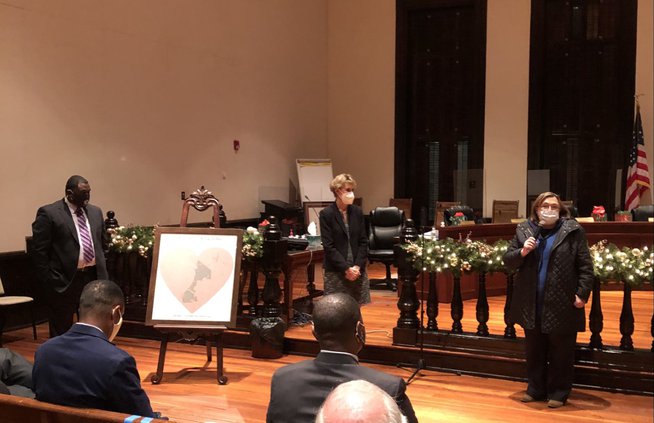COVINGTON, Ga. — A judge said he agreed with Newton County government’s long-standing method of not including longevity pay and most other extra compensation in calculating top officials’ salaries despite an attorney’s claims it should.
However, Senior Judge David Sweat of Athens also told attorneys to come to an agreement in 30 days on what should be included in a final method of calculation or he will decide for them in a final ruling, one attorney said.
The case is related to claims by County Chairman Marcello Banes and Probate Judge Melanie Bell they are owed thousands of dollars in back pay because of the Newton County government’s longtime miscalculation of the salaries for their positions.
The Newton County government filed the lawsuit in Superior Court in Covington in October against the chairman and Probate judge and asked the court to determine which of two methods should be used to calculate their pay since both took office in January 2017.
The county said in its lawsuit its “custom and historical practice” follows a 1994 local law that does not include longevity pay and cost-of-living allowances (COLAs) to calculate the highest minimum annual salary — a method that determines the sheriff has the highest minimum annual salary among constitutional officers at around $80,000.
Banes and Bell contend their salaries should have been calculated under a general state law that uses the highest minimum annual salary of the chairman and four constitutional officers plus longevity pay and COLAs.
The four are called constitutional officers because the state constitution specifies their duties and minimum salaries — both of which the county government does not directly control.
The chairman and Probate judge say the law states the highest minimum salary is calculated by adding base pay, local supplements, all longevity pay and all COLAs together — placing them at higher pay levels because of the compensation over time to Clerk of Courts Linda Hays, who first took office in 1983.
As a result, they have said in past filings that each is owed about $180,000 in back pay since 2017.
The Alcovy Judicial Circuit’s Superior Court judges Oct. 15 filed an order to recuse themselves and sent a notice to the administrator of the state’s 10th Judicial District to find a new judge — leading to Sweat hearing the case.
Sweat said he read the text of the 1994 local legislation approved for Newton County and he understood it referred to the use of the highest annual minimum salary among the four constitutional officers as mandated in state law plus the chairman — but without longevity pay and cost-of-living allowances added to it.
The judge said it "seems to me nonsensical" that a law would be written that would effectively lower the pay of a county official if a long-serving official who had been given regular longevity pay and COLAs retires and the official's replacement does not have the same level of benefits.
Attorney Stephanie Lindsey, representing Banes and Bell, told Sweat that the 1994 local law was written that way because it did not contemplate officials like Hays remaining in office for decades.
Sweat told Lindsey and the county’s attorneys — Eric O’Brien and Timothy Buckley — to agree on what should be included in the calculation and include it in an order.
However, he said if no agreement was reached he would issue his own final ruling in 30 days, Lindsey said.






